Medical School Interviews are the last hurdle in the application process and possibly the most important. Your grades and extracurriculars got you in the race but your medical school interviews are what get you past the finish line.
This article will cover what to expect on interview day and how to make the right impression that will solidify your spot in their next class.
Table of Contents
- What to Expect On Interview Day
- Medical School Interview Types
- Who Are the Interviewers?
- How To Prepare For Your Interviews
- Common Interviewing Mistakes
- Helpful Tips for Interview Day
- What To Wear For Medical School Interviews
- What to Do After Your Interview
What to Expect On Interview Day
Most of your interviews for Medical School will have a similar format.
In most cases, you’ll be welcomed by admissions leadership followed by an ice-breaker with the other applicants.
This ice-breaker is your first interview. It allows the admissions committee to see your ability to interact with other students, work in a team, and act as a leader.
A majority of the day will consist of presentations about the curriculum, student affairs, and financial aid. Make sure to take notes and pay attention to what presenters emphasize. You can use this to your benefit during your interview.
Monitor your facial expressions during this time. Interview days are long and stressful, and it’s really easy to fall into RBF.
Next and my favorite part of the day is the campus tour. During this time, ask the tour guides questions about the school and show your interest.
Everyone you speak with can potentially evaluate you. Staying engaged in every aspect of the interview day can help you ensure your spot.
Then of course, you have your formal interviews
The interviews could be at any point of the day. Some schools will give you a detailed schedule of when you have your interviews so you know what to expect while some may just spring it on you. You could go straight from our tour to your interviews with little notice.
Below I address everything you’ll need to know to have a successful interview.
Medical School Interview Types
Each Medical School has its own unique interview format.
Schools usually list the interview format in your interview invitation, but if you’re not familiar with the types of interview medical schools conduct it could be hard to know what to expect.
Below is a quick explanation on each type of medical school interview so that you know what to expect on interview day:
Open Application Interview:
In this interview type, the interviewer or interviews have access to your application and essay prior to your interview. This means that they can ask more specific questions about your experiences, your grades, or your MCAT.
Closed Application Interview:
The interviewer will know nothing about you before you enter the room. You can use this to your advantage if you happen to have a lower GPA or MCAT because it provides the opportunity to control your interviewer’s overall impression of you.
Individual Interviews:
One-on-one Interview. Simple as it sounds. This could be an open or closed application.
Panel Interviews:
An interview with a panel of two or more interviewers. In these situations, make sure not to only focus on one of your interviewers. Spread your questions between the interviewers and try to make a impression on each.
Multiple Mini Interviews (MMI’S):
This is by far one of the most daunting interview formats for most medical school applicants so I’m going to in greater detail than the other interview types listed above.
MMI’s are intimidating because they aren’t something a person would normally be exposed to as an undergraduate or when interviewing for a job.
The purpose of a MMI is for the school to see how you would approach real life situations.
In this interview type, the schools present you with scenarios that test your ethics, empathy, interpersonal skills, or your ability to work as part of a team.
In the classic MMI format, you’ll be given 90 seconds to read a scenario. After you read the scenario and consider your course of action, you are prompted to enter a room. Once you enter a room you are given two/three minutes to explain how you would approach this scenario as well as your thought processes as to why you chose to approach the scenario in a specific way.
In some cases, the interviewer will be silent. Don’t let this throw you. They may have been prompted to say nothing and not to show emotion.
In other situations, you may have an interviewer that is instructed to challenge your answers or to ask follow up questions. When presented with a challenging interviewer try to defend your logic without getting defensive.
I know that sounds contradictory so to explain this a little more detail. When challenged, focus on explaining the logic of your argument and the different factors that affect the situation.
Try to defend your points the best you can while remaining respectful. They don’t want you to just agree with them… they want to see if you can come up with a well thought out point of view and defend it. However, if they present a great point, don’t just dismiss it. Consider it, address it, and possibly accommodate it into your approach if necessary.
When you finish your explanation and you still have more time, you don’t have to keep talking. Just sit silently until it’s announced that you can leave the room. You won’t be penalized. Rambling after you’re done with your explanation will hurt you more than just sitting silently.
Note that some schools do MMI’s using simulated patients. You’ll still be given a scenario but instead of talking through the situation, you’ll be interacting with an actor as if you are part of the scenario. For example, you could be taking the role of a friend or a shadow or a student doctor.
I’ll put out an article on how to answer MMI questions soon!
Who Are the Interviewers?
Your interviewer(s) could be anyone who works at the school or that is affiliated with the school, not just members on the admissions committee.
At the institution I worked at: faculty, students, alumni, or staff could all be interviewers.
This reinforces why it’s extremely important to treat every person you interact with like an interviewer including your fellow applicants. Your interactions and behavior during the day can reflect on you as much as your physical interview.
Also when you get accepted, they’ll be your future colleagues, professors, and support system.
How To Prepare For Your Interviews
Just like every other aspect of the application process, a successful medical school interview require preparation and work.
Review Your Application
Prior to your interview review your application, personal statements, and secondaries. Your interviewers may have the application with them and may ask you specific questions about a certain activity on your application.
As you review each of your experiences ask yourself these questions:
- How were you a leader in that situation?
- How did you work in a team to be successful?
- How did you grow from it?
- What did you learn?
- What would you have done differently?
- Were there obstacles and how did you overcome them?
- How does this experience relate to my passion for going into medicine?
- Why was this experience significant to me or my motivation to go into medicine?
As you ask yourself these questions, you’ll notice that you can use one experience to answer a variety of different questions.
This will help you compartmentalize your experiences and grow your ability to adapt your experiences to almost any question.
Practice with a Friend, Family Member, or Advisor
The best way to improve your interviewing ability is to do mock interviews. This will allow you to get comfortable answering questions under pressure and learn the best way to deliver information.
If you’re an undergraduate, look into your school’s career office. More than likely they’ll have mock interviews that you can sign up for. There may also be an option to do a mock interview with your pre-health advisor.
When you do your mock interview, make sure to simulate a real interview. Dress dress in business professional, prepare an answer to “tell me about yourself”, and review your application/essays.
Practice not letting it show when you mess up and keeping a confident front throughout.
Mock interviews allow you to make mistakes now so you won’t make them during your interview.
Prepare Answers to These Questions Before Interview Day
Tell me about yourself.
Though it should be the easiest question because no one knows you better than you… for most people, this is the most difficult question to answer.
Pro Tip: Don’t start from the beginning. This should be about how your experiences culminated in your passion for medicine not about where you grew up. They will only give you so much time before they want to move on to the next question, so get to the point fast.
What do you want to become a physician?
Pro Tip: Come up with two to three reasons/ experiences that have influenced your passion for medicine and an ending that ties them all together. This shouldn’t be super long. Focus on being efficient. A short well-thought answer is better than a wordy answer that doesn’t hit the points you need to.
Why do you want to practice osteopathic medicine? ( For D.O. Interviews)
Pro Tip: Know more than the basics of osteopathic medicine. For example, don’t just say that you like osteopathic medicine because it focuses on treating the body as a whole. Have a true understanding of what that means and entails before your interview. Also, know that A.T. Still is the Founder of Osteopathic Medicine.
Please note that you want to be prepared, not rehearsed! Schools want to see your personality.
Common Interviewing Mistakes
Rushing Your Answers
When asked a challenging question, it’s okay to pause and take a second to think about your answer. When you’re in a high stress situation like an interview, a couple second pause feels like an eternity but in reality to your interviewer it’s not even noticeable. It also shows them that you care about your answer.
Being Afraid to Admit What You Do Not Know
If you try to act like you know something that you don’t know, your interviewers will pick up on that and could take it as a lack of humility.
Focusing on What You Think They Want to Hear Instead of What Makes You Unique
Talking about what’s important you will make a greater impact on your interviewer than talking about what you think is important to them.
For example, if you’re extremely passionate about services and you hate research. Talk about your experiences serving others and how it’s grown your passion for medicine. Don’t talk about the research project that you only did to “check a box.”
Interviewers want to see your unique interests and personality, not the human version of the application they already read.
Show them you! You’re smart, hardworking, passionate, and have so much to give!
Apologizing When You Mess Up
Even if you mess up, act like you said exactly what you meant to say, Most of the time your interviewer won’t even know you “messed up.” Only you know what you planned to say, so in their eyes, you said exactly what you planned to.
Helpful Tips for Interview Day
- Arrive Early. This will allow you to prevent the added stress of trying to figure out where you’re supposed to go.
- Adapt to your interviewer. If they’re serious and professional match their tone. If their relaxed and casual match that tone.
- Be yourself. Talk about what you care about… not what you think they want to hear.
- Bring a pen and notepad. Take notes during each interview so you can remember the important information that you learned. This will be valuable when deciding between schools.
- Have questions prepared to ask your interviewer. You are expected to have well thought out questions about the school prepared for the end of your interview. Have several prepared because some may be answered during the interview.
What To Wear For Medical School Interviews
The goal on interview day is to give the impression that you are well put together and confident.
The first thing the interviewer sees is how you present yourself when you walk into the room and a huge component of the impression is based on how you dress.
On your interview day, you are expected to be dressed in Business Professional.
What is Business Professional?
Business professional means that you wear a blazer, dress shirt, dress pants/skirt, and dress shoes.
I’ll put examples below for your reference.
Example Interview Outfits
Disclaimer: These are just examples I found on amazon. I am not affiliated with any of these companies and will not receive any money if you purchase these items.
Female Clothing Options:
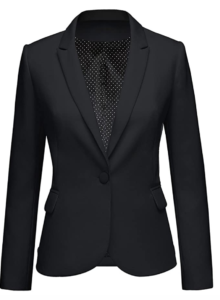
Simple and Professional
The goal on interview day is to stand out for your personality and professionalism. Not your outfit. Try to stick with grey, black, and navy for your blazer and slacks/skirt.

Get Noticed for the Right Reasons
Your dress shirt can be almost any color, but I would just recommend staying away from neon colors and crazy patterns. Some great color options for dress shirts/ blouses are maroon, navy, cream, white, and most blues.
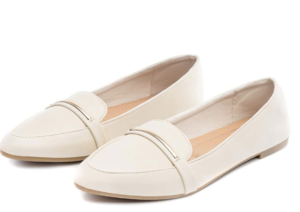
Comfort = Confident!
Make sure to wear comfortable shoes that you have a chance to break in prior to your interview day. Flats can still be painful if they’re not broken-in correctly. You don’t the day to be ruined by cut heels and blisters.
Also, make sure your shoes are closed-toed and not visibly scuffed up.

Invest in a pants with real pockets!
This will give you a place to put your phone during your interview.
Make sure to iron your outfit before your interview.
The care you put in your appearance will show your interviewer you care about getting into your school.
Male Outfit Options:
The Future of Medical School Interviews
Due to COVID-19, the future of medical school interviews is unknown terrain. There is a significant possibility that medical school interviews may become virtual.
Check out my guide to Virtual Medical School Interviews to learn what to wear and what not to wear during your virtual interviews as well as other tips.
Fun Fact About Me: I worked as an executive recruiter during the beginning of COVID and developed the virtual interviewing best practices for the entire university.
What to Do After Your Interview
After your interview day, send a thank you letter.
On your interview day take note of your speakers and your interviews. You can usually ask your guide/ admissions coordinator for their contact information. They may also provide contact information in your interview packet.
Ask your guide about how the school would like to receive thank you letters. Some schools may have you send it to the individuals you interviewed with while some may have you send all letters to one location for them to distribute.
I personally wrote all of my interviewers a handwritten note that touched on our conversation, my interest in the school, and my appreciation for the opportunity to interview.
Be Confident. Be You!
Remember: Receiving an invitation to interview means your stats are already good enough to get acceptance. This is your opportunity to make an impression and show them the amazing things about you that can’t be seen from an application.
Goodluck!!
Subscribe to PugMed for exclusive advice to help you get into medical school!
For tips on how to boost your MCAT Score see my article on prepping for the 2020 MCAT Exam.
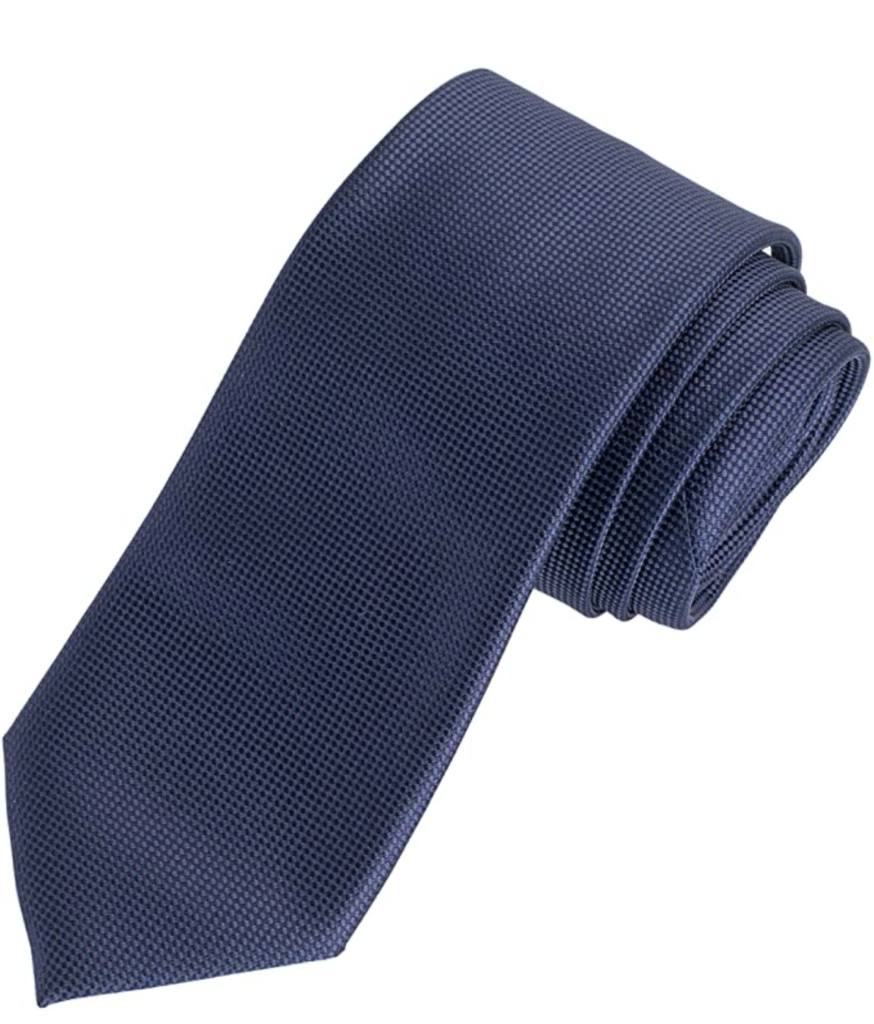
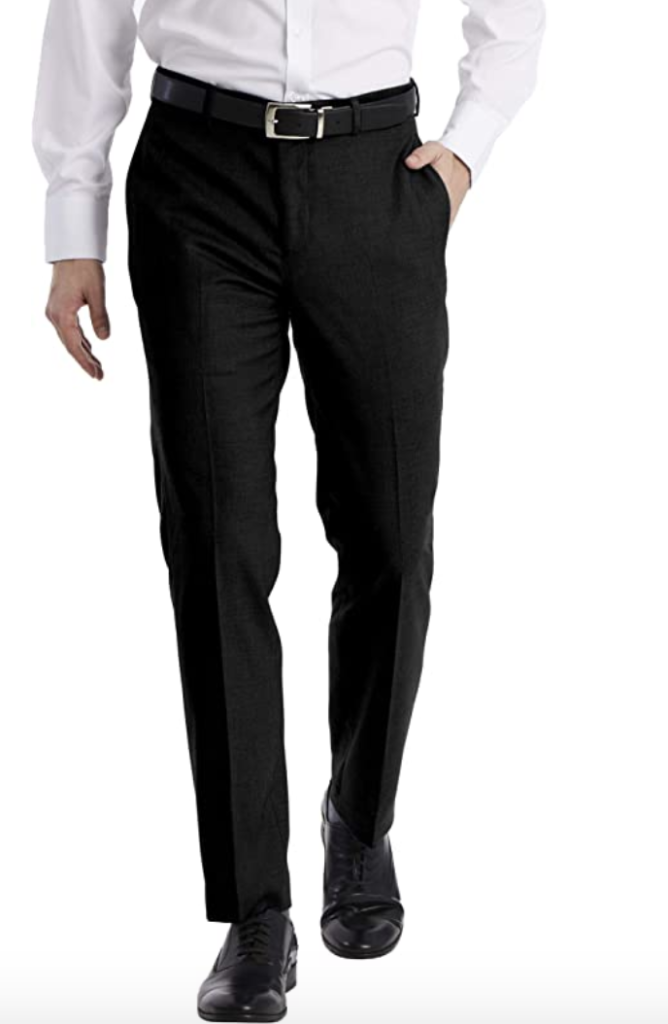

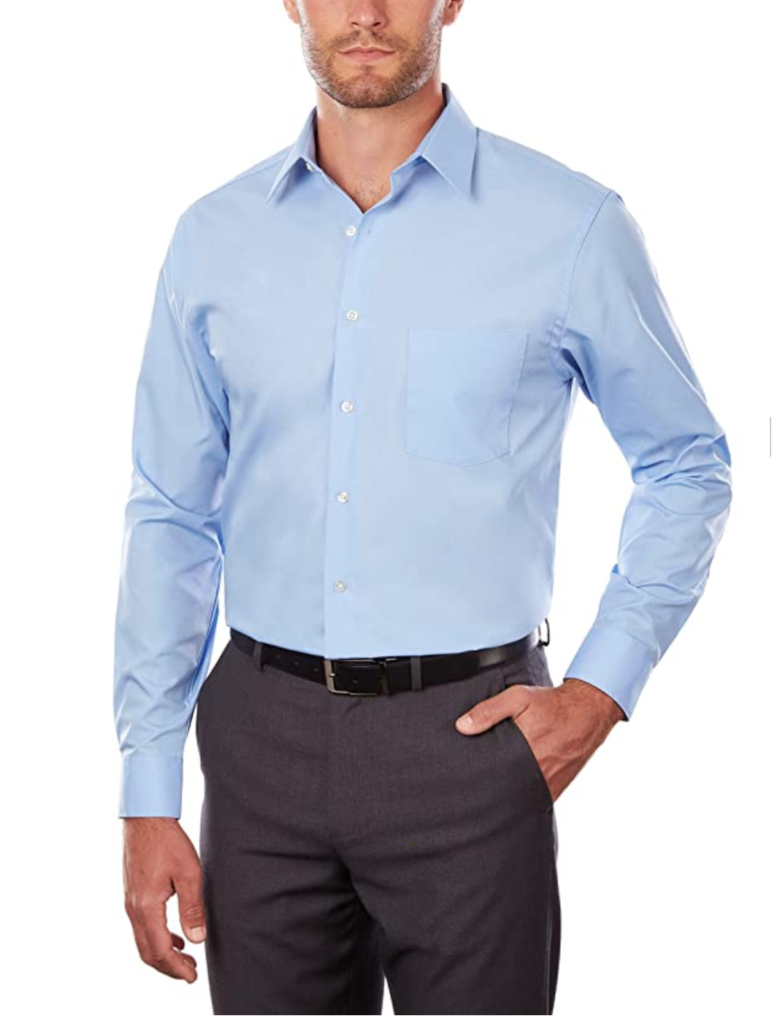

Thank you! Very helpful
Pingback: 5 Steps to the Perfect Virtual Medical School Interview - PugMed
Pingback: How Not To Write A Personal Statement Pre-Med Advice - PugMed
Pingback: AAMC VITA: Everything You Need To Know - PugMed